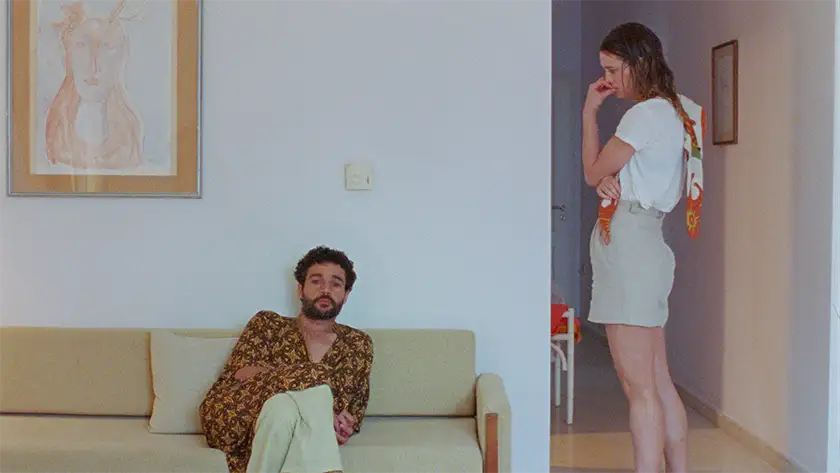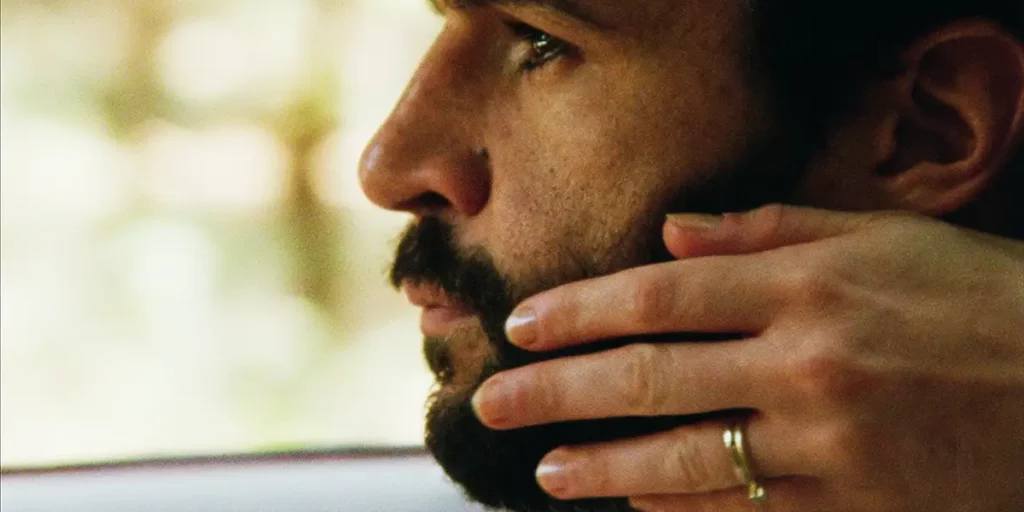Justin Anderson’s Swimming Home takes its artistic liberties too far, dashing what could have been an impressive debut feature film.
Director: Justin Anderson
Genre: Comedy, Drama
Run Time: 99′
Tribeca Premiere: June 10-14, 2024
Release Date: TBA
There’s a certain despair felt while watching a promising film run completely off the rails. A particular disappointment in the untapped or underutilized potential that manages to peak through an onslaught of conflicting direction changes. Justin Anderson’s debut feature film, Swimming Home, has an impactful start and a strong foundation to build quite an extraordinary story.
With actors whose brilliance is always reliable (which is the case with Christopher Abbott and Mackenzie Davis) at the helm of the story and a clear intention to make a unique, modern art-house film, it is Anderson’s game to lose. Unfortunately, the film is unable to live up to its own artistic visions.
Swimming Home is a film adaptation of Deborah Levy’s novel of the same name. War correspondent Isabel (Mackenzie Davis, of Station Eleven) and her poet husband Josef (Christopher Abbott, of Sanctuary) are vacationing with their 15-year-old daughter Nina (Freya Hannan-Mills) following Isabel’s return from her latest work trip. After retrieving their family friend Laura (Nadine Labaki) from the airport, they come back to their vacation villa to find a naked woman floating in their pool. After introducing herself as Kitti (Ariane Labed, of The Lobster), she tells the family she only came by because the villa’s caretaker was helping her find a place to stay. In a spur-of-the-moment decision, Isabel offers Kitti a place to stay in the villa’s guest house, much to Josef and Laura’s chagrin.
Kitti slowly begins to infiltrate the family’s vacation, picking off the members of the already weakened family unit one by one to understand their deepest desires and darkest thoughts. While Nina and Isabel invite the invasion with open arms, Josef retreats into himself as Kitti aggressively tries to pull out the secrets of his mysterious past.
The film begins with plentiful momentum to throw the audience into this sun-soaked world that is more tumultuous than what meets the eye. From the very first sequence of the film, we know this family is full of secrets. After picking up Laura, we travel with the family in the car ride to the villa. The framing of the conversation avoids showing the characters speaking in their entirety. We hear their words but don’t get a clear shot of their faces, just fragments of their bodies.
Laura is surprised Isabel offered Kitti a place to stay with the family, given Josef’s history of affairs with women just like her. It’s clear this family has had their share of divides; whether it be Josef’s affairs or the lack of time Isabel spends with her family due to her work, they are far from perfect. The introduction of Kitti further exposes the cracks in the family dynamic. Kitti begins to memorize and recite Josef’s poems back to him, causing him to reveal he can’t find it in himself to write. Kitti keeps Isabel company, leading Isabel to divulge she feels more lonely with her family than when she’s alone on trips for work. Kitti takes a special interest in Nina and Nina unveils that her mother has never truly been present in her life.

Everything that Kitti touches, every small act she commits reveals more and more about the dysfunction of this family. She serves as a catalyst to the story, revealing the truth of the family’s dynamic to the audience and driving the plot forward as the family must finally face the issues they try to run from. Isabel and Josef have grown in completely different directions but up until this point have refused to admit it. Now their differences are thrown into the light and they must deal with the consequences, which is exactly where the film begins to completely unravel.
The film’s first act and solid performances make it seem like it would progress into a thoughtful, abstract story about the complexity of one’s identity within a family dynamic. Yet, at the start of the second act, the movie throws itself off the deep end, doggy-paddling to save its artistic sentiment right up to the ending shot.
An interpretive dance scene marks the film’s entrance into its second act, but once the story returns to reality, the characters have evolved in completely separate directions. Isabel is a different person altogether, with seemingly no explanation as to why. The tone of her character swings in a completely foreign direction, leaving behind a beautiful performance by Mackenzie Davis and forcing her into fight or flight as she tries to take on what feels like a brand-new character.
Josef and the significance of his infidelities are pushed to the side in favor of a storyline about leaving Bosnia as a child during the war. Laura’s dashed from the central story and only reemerges as a vessel for audience members to voice their worries about what Kitti is doing to this family. Finally, Nina quite literally disappears for a chunk of the film, with Josef seeming to be the only person to show interest as to why.
The progression of the plot and further dive into the psychology of the characters that you yearn to have explained are scrapped to make room for more interpretive dance sequences and a big twist that falls in line with the complete bizarreness of what is going on in the rest of the film at this point.
Christopher Abbott, Mackenzie Davis, and newcomer Freya Hannan-Mills turn in earnest and profound performances as the central family within the story, however, the film veers too far into the realm of abnormalities to allow them to shine. By the second act, the artistic vision of Justin Anderson completely envelopes the film, leaving the actors stranded in time as the audience waits for the film to settle back into itself. Spoiler alert: it never does.
It’s not that the artistic liberties and experimental storytelling make no sense within the context of the plot, it’s more so that the film tries too hard to be strange in order to come across as impactful. Anderson says he was inspired by classic avant-garde art-house cinema of the past, but his movie puts too much effort into attempting to recreate what makes those films singular.
The story of Swimming Home is solid in and of itself. The cast of actors are on their A-game. The cinematography has the beautiful ability to inform viewers about the deeper meaning of the tale being told without having to state it plainly. Simply put, the film didn’t need to try so hard. Its desire to be arty is actually what causes it to veer into unwatchable territory, as it completely loses itself in half-baked metaphors and pretentious iambic pentameter.
Swimming Home premiered at the Tribeca Film Festival on June 10-14, 2024.

